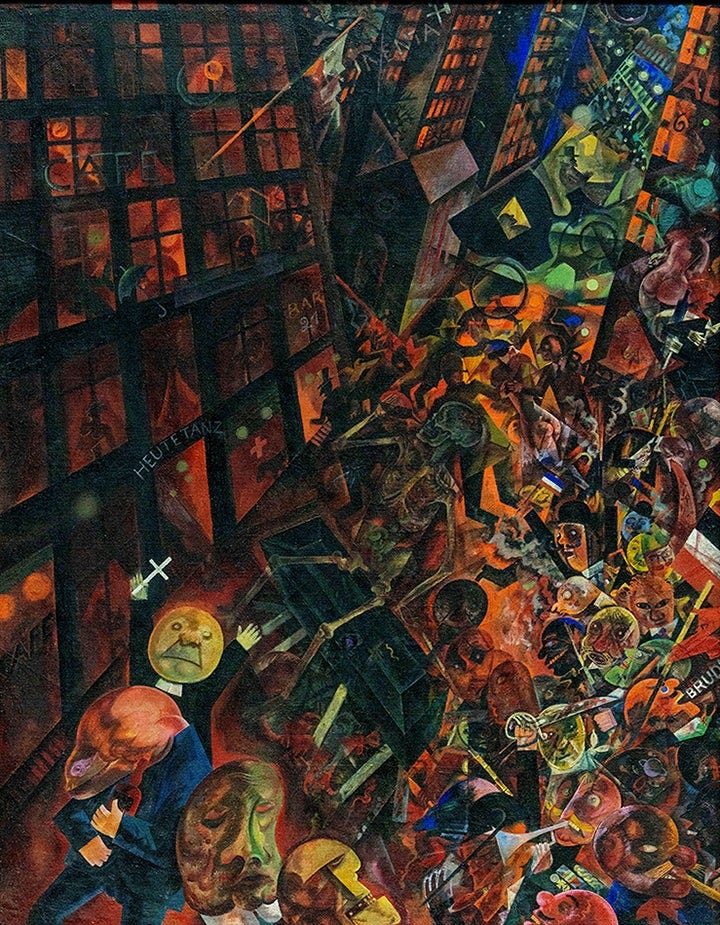The Saturday Read: 2024
Inside: Gaza, postmasters, Gervais, LinkedIn, the 2010s, and American carnage.
Good morning. Welcome back to the Saturday Read. For any first time readers this is the New Statesman’s weekly guide to the best writing on ideas, politics, books and culture, sent to NS subscribers and registered readers. This is Harry, along with Will and George Monaghan.
We have some new and returning sections today. Will, reviving an old theme, is interested in how many novels you read in 2023. We have inaugurated a new weekly section on the US election. And we have an arresting mix of pieces below.
Click here to read this online if it cuts off midway. If you subscribe to the NS, thank you for being a reader of ours. If you don’t yet subscribe and these pieces intrigue, perhaps you’d like to try a subscription. Subscriptions are half price in January with the discount code JAN50. We’d be glad to welcome you as a subscriber.
1—“They kill anything that moves.”
The new year arrives with the same conflicts playing out. The war in Gaza is intensifying. Bruno Maçães, our foreign affairs correspondent, spoke with Gideon Levy, an Israeli journalist and author, about the current state of the war and the possibility of peace.
Levy, now 71, previously worked as an aide and spokesman for Shimon Peres, before becoming a reporter and writer for the leading Israeli daily Haaretz in 1982. Here Levy responds after Maçães asks him what the truth of the conflict is, as both sides continue to pump out propaganda. (Bruno also wrote our cover this week.) WL
“The fact that this is a massacre and a mass killing, and brutal and by itself a violation of many parts of the international law, [there is] no doubt about it. The fact that they are killing, indiscriminately, without any selection – they admit it. They kill anything which moves in Gaza, including hostages, Israeli hostages… I wouldn’t call it – right now – a genocide. It’s not a declared policy of Israel. It’s a declared policy of Israel to kill without any restraints [but] I don’t think the idea is to eliminate the population of Gaza. Not that they are so moral, but they know this is not practical.”
2—“More outrage will doubtless follow when the company posts its yearly accounts for 2022-23.”
Blaming Fujitsu for the Post Office scandal is either fatuous or futile. Will Dunn has you covered on the story of the week. Brush up on open tender systems and call-off contracts. The government did not act as the scandal unfolded throughout the 2010s, and cannot, he argues, act now. (Anna reviewed the drama – Mr Bates vs The Post Office – that has gripped the nation. Our leader addresses the issue too.) GM
Data collected by government contract analysts Tussell shows 197 public sector contracts have been awarded to Fujitsu since 2012, and it is hard to find an arm of the British state in which it is not involved: the Home Office, the Ministry of Defence, the Foreign and Commonwealth Office, HM Revenue & Customs, Transport for London, HS2, Scottish Water, Thames Valley Police, the Financial Conduct Authority, the Land Registry, NHS England, local authorities across the country – the list goes on and on. The Conservatives, for all their talk of a small state, have overseen a historic increase in spending on private companies, from £64bn in 2010 to £222bn last year.
3—“She had so much wanted the quicksand of America to be less viscous than the mud that had sunk Europe.”
We’re going to spend a year anticipating American carnage. Hannah Arendt did so in another torrid American time, during the civil rights struggle. Lyndsey Stonebridge returns to her text, On Revolution (1963), in search of understanding today. HL
In Arendt’s story, America’s revolution (unlike that of France) was spared the horrors of bloody absolutism because the colonies were also spared the horrors of immiseration that plagued Europe in the 18th century. The women on their march to Versailles, she said, quoting the British historian John Dalberg-Acton, “played the genuine part of mothers whose children were starving”. Because stark naked poverty was so extreme in France, so too were its solutions.
The power of sheer human necessity became sheer terror in the effort to “regulate economic questions by force”. The suffering would stop, or it would be made to stop. Arendt never claimed that poverty or economics were unimportant to progressive politics. She simply understood that you have a better chance of establishing a republic based on public reason and not violence if people are not living in a constant state of physical and mental pain. Suffering has a way of cancelling out argument. Bread first and then ethics, as Brecht had put it.
4—“In the end, we’ll snap.”
This is your chance to finish an article on the One Nation Tories. Anoosh Chakelian writes engagingly of her confab with the in fact quite formidable Damian Green. For more on politics, Andrew Marr took a look this week at progressive pessimism while reviewing two new books on Labour; Simon Heffer wrote acerbically on Rishi Sunak’s coming end; and George Eaton explained why parliament has no say over the UK’s air strikes on Houthi rebels in Yemen. GM
“There are some very intelligent people on the right of my party in danger of falling into an easy trap for a right-wing politician, which is to start promising a better yesterday,” he warned. “Telling women to have more babies and stay at home doesn’t feel very realistic in 21st-century Britain. It’s a blueprint based on a combination of nostalgia and idealism that just doesn’t resonate.”
Being able to track carbon emissions is a crucial way for businesses to reduce their environmental impact and meet their ESG goals.
How can organisations help the UK to reach its ambitious net-zero targets if their leaders don’t know their full impact on the environment?
Read the full article to learn how organisations can turn their sustainability goals into action.
5—“Gervais is lucky that his legacy will be a good one. But not for the reasons he suspects.”
Ricky Gervais is probably pleased to return home to find himself freshly derided online. But there is not much for him to relish in this review of his latest Netflix special by Finn McRedmond. She is not outraged so much as unimpressed. GM
Somewhere in the past 20 years Gervais lost his way. Today he makes headlines with the so-called anti-woke comedy that has none of the soul or wit of The Office, nor any of the light touch and insight of Gervais’s other critically successful venture, Extras (2005-07). The celebrated chronicler of multi-lane roundabout Britain forgot how to make people laugh. And in this, there’s poetic justice: the mastermind behind David Brent was fated to become him.
6—“In the 2010s the spectacular online Left formed an army of revolutionaries without revolution.”
For our Weekend Essay, Will Davies examines the resurrection, struggle and decline of the left in the 2010s. The decade ends up looking like the Sixties, just without the fun bits (sex, drugs). This is sweeping stuff, and immensely persuasive. WL
A wider lesson for the left, then, is that no transformative political movement can be built purely on resentment towards the “mainstream”, as if recognising the shortcomings of representative democracy were an adequate basis to correct them. The largest protest movements of the last 60 years have arisen in opposition to state violence of one kind or another, be it in Vietnam, Iraq, the United States itself (in the case of Black Lives Matter) or Gaza today.
Such mobilisations were formative for the New Left in the 1960s, and (given Corbyn’s influences and preoccupations) shaped Britain’s own particular experiment in left populism. The scale of these marches suggests that they must be generative for the left in some way, but that is never guaranteed. Anti-war protests have in the past had a demonstrable impact on election results, though (as Joe Biden may yet discover) rarely the ones that the liberal centre would like. The longer-term effect is that the crisis of representation is deepened, as no doubt happened in Britain after 2003.
7—“America has invented new forms of loneliness the way Picasso invented new forms of art.”
Donald Trump is back. The United States has committed itself to defend Taiwan if China attempts to take back the island. Joe Biden rarely looks like he can walk in a straight line. Nevertheless, Lee Siegel makes a compelling case that the gravest crisis America faces is loneliness. (This interview by Anoosh picks up the theme in Britain.) WL
In the erosive capitalism with a caring face that prevails in a declining American republic, there is no consensus on what is good, and many people are lost. In these troubled American woods, populism – on the right and on the left – is contemporary America’s offering to a country of lonely people who want passionately to believe that they are truly not alone. (So ardent is this desire to feel not alone that alleged sightings of UFOs in America exceed that in any other country; the Pentagon has even established its own office devoted to tracking possible interplanetary friends.) Hatred is the quickest kind of intimacy, and populism’s fevers consist of powerful aversions that have the effect of binding the hater to the object of their hatred.
8—“You’re never more than ten metres away from a West Wing super-fan in Westminster.”
Never one to shirk contention, Will has attacked that shibboleth of our age: the West Wing. It’s a fine read, although the delusions Will thinks it inspired don’t have a great deal to do with the show’s undimmed brilliance (which gets better in its final years as the gang cracks: Jed vs Leo, Josh vs Toby). HL
“Like nearly every Democrat,” Barack Obama’s speechwriter David Litt wrote in his memoir, “I was raised, in part, by Aaron Sorkin.” When the Veep creator Armando Iannucci toured the Obama White House, he found it staffed by “political nerds”. They were “absolutely obsessed… They kind of hold that show in higher regard than their own job.” Ordinary people – or “real people, RPs” as Obama White House staffers referred to them – only existed in the sense that words would be showered down on them from the presidential lectern.
9—“A running theme is candour, or at least the appearance of it.”
The world’s weirdest social network just keeps getting weirder, writes Jos Gogarty. Welcome to LinkedIn, the site where work is life. HL
For much of its 21-year history, it was neglected. Clout-chasing journalists were addicted to Twitter. Those aspiring to a beautiful life Facetuned themselves on Instagram. LinkedIn was the equivalent of the births, marriages and deaths section of a broadsheet newspaper: a place to post about bare biographical outlines, like schools, degrees and jobs.
Something has changed. The social media also-ran is, somehow, becoming the platform of the day. Over the past decade, as nominally cooler platforms lost user engagement and became choked with spam, the volume of posts on LinkedIn spiked by 41 per cent. It now has almost a billion users, putting it in the top ten social media platforms. All human life is here.
Best of the Rest
Times: Bates hails move to quash sub-postmasters’ convictions.
Telegraph: What keeps Starmer up at night? Many crude jokes to make here, which I simply refuse to make.
Bloomberg: Xi, Biden and the $10trn cost of war over Taiwan.
WSJ: How the Pentagon ended up being run from a beach. WFH culture finally goes too far.
NYT: Blocked toilets shake Eton. That’s some expensive shit.
Sam Adler-Bell: The fights to be Trump’s next courtiers.
Alan Beattie: The immigration smokescreen is beginning to lift.
Janan Ganesh: The genius of Britain’s anti-intellectualism. Every word of this is true.
Agnes Callard: The paradox of apology.
Juliet Samuel: When scandal strikes, Britain leaps into inaction. Column of the week.
Man cannot stop watching Christopher Nolan’s Tenet. And it has nothing to do with the film.
South Korea bids farewell to dog meat. A small step for South Korea, a giant leap for South Korean Labradors.
Bill Clinton’s email problem. I wish it was “everything keeps going to junk” but it’s not that.
Elsewhere on the NS
John Gray explains why the distinction between science and magic is not quite what it seems.
Jeff Bezos will celebrate his 60th birthday this weekend. Has anybody this rich, asks Esther Watson, been as… average as Bezos?
It feels cool to be ignorant of influencers but MrBeast racked up 586 million views on YouTube in the last seven days. Sarah Manavis explains his bewildering appeal – and philosophy.
For the Weekend Interview, Wolfgang Streeck talks to Gavin about the state of things in Germany.
The British government evicted the Chagossians from their island home to make way for a military base in the 1960s. Their plight, Morgan Llanque writes, exemplifies the ongoing tension between Western justice and Western security.
Natasha Voase takes a look at POSH, the part of the Bloomberg terminal you don’t know about, and wonders whether we are seeing the signs of the next banking crisis in its orange text.
Alona Ferber checked in with Kenneth Roth, the former head of Human Rights Watch, on the case South Africa is making against Israel in the International Court of Justice, accusing its government of genocide.
Hannah Barnes, the author of Time to Think – one of the most impactful non-fiction books of 2023 – has joined the NS. Here is the first of her columns for us.
Hannah Williams rebels against Taylor Swift. Don’t miss our Christmas Twitter hit.
Or Geoffrey Wheatcroft’s characteristically fine reflection on Peregrine Worsthorne: the type of journalist who no longer exists.
Arno Mayer, the historian of the Holocaust and modern Europe, died at 97 in December. Enzo Traverso introduces his long, decorated career.
Notes on America
We are launching a new Saturday Read section to keep you updated on the US election and the question of the year: will Donald Trump be re-elected? HL
“It is odd to see a man who embodies so many sins… be so widely embraced by the religious right.” How did Trump manage to win over evangelical Christians, who account for an astounding one in four American voters? Jill Filipovic explains.
“If he were writing The Art of the Deal today, Schwartz said, it would be a very different book with a very different title. Asked what he would call it, he answered, ‘The Sociopath.’” This 7,000-word New Yorker profile of Trump’s ghostwriter (from 2016) is one of the best things I read this week. It gave me new insights into him, which is going to be a feat for anyone this year.
If Biden loses in November, three causes will stand out: inflation, immigration and his inability to form basic sentences. Here are helpful graphs from the Economist for the first two of those. I’ll work on a hand-drawn chart for the third.
And with that…
Hello, and happy new year. Three months into 2023, we asked SR readers whether something had gone wrong with the novel. I had spent a fairly gruelling few weeks going to book launches and asking people what they were reading: very few literary types were reading anything fictional, as it turned out. In 2023 I did not read any fiction until the end of March, barely got going with novels until July, and finished the year having read 19 of them.
This took heroic effort on my part. I had to stop attending book launches for one thing. A few were rereads (particularly for this piece), which did feel a bit like cheating. If I had to recommend one, it would be Lord Jim at Home by Dinah Brooke. A strange, disgusting novel about a beautiful, blank young man who is always at an angle with everything and everyone around him. There is no respite in this book. It terrifies, then you stop reading it, and it comes back to terrify you again.
We’d like to know what you read last year, and what you are planning on reading this year. Harry says (and this may be the first premonition of a major personality change – we can but hope) that he has already read two novellas this year. Woah.
Perhaps you might like to subscribe to the New Statesman. Stay up to date with everything you need: from news and analysis to comment, criticism and long-reads.
Whether you’re looking for a sharp blog or a finely written feature, the New Statesman has you covered. Have a good week, and catch you next Saturday.






















I have been retired for almost ten years and have found reading to be the most rewarding way of passing my time. I read novels old and new, I have reread Robert Louis Stevenson to remind me of my youth, some Dickens, loved Stienbeck and Mark Twain. Of the more modern writers I have enjoyed Marlon James, Ian Mcewan, but I find Flan o Brien endlessly thought provoking and entertaining.
I also read some biography and have spent some time trying to understand some of the science and mathematics which I was supposed to have understood when I gained qualifications in these subjects during my youth. I hope my eyesight does not deteriorate to an extent that no longer allows me to enjoy the printed word in all it's forms.
I've read novels all my life (am 81 now) and my source these days is paperbacks from charity shops. A very wide range of unexpected hits and misses, but great entertainment.